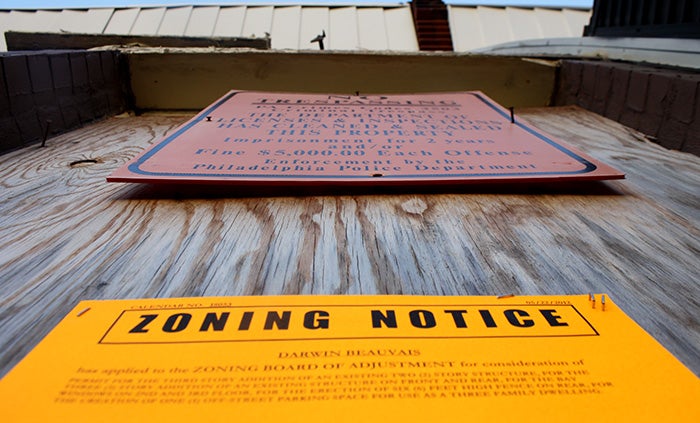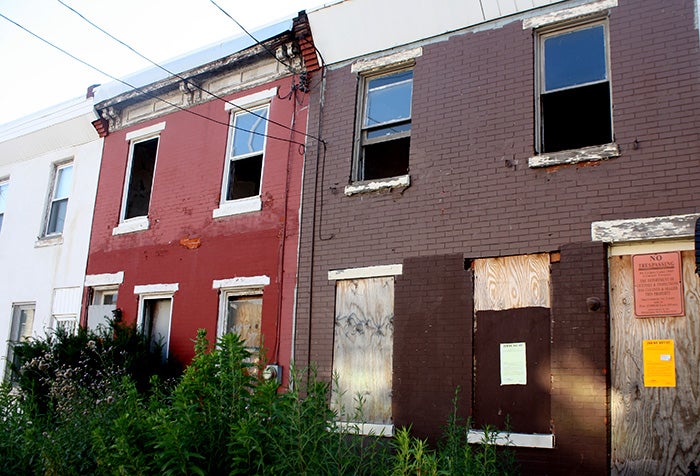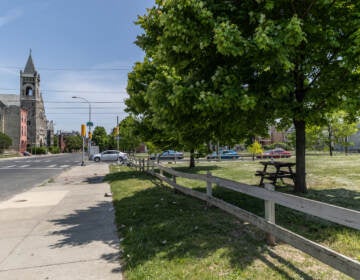Planning Commission opens applications for Registered Community Organizations
As of today, June 1, 2012, the Philadelphia City Planning Commission is accepting applications from civic associations and other neighborhood groups looking to become Registered Community Organizations (RCOs). Groups interested in registering with the Planning Commission may print and mail in a form linked on the Commission’s site or apply online. The current application period ends June 30.
In order to satisfy the submission requirements for registering as an RCO, a group must include the name of a contact person, the geographical boundaries of its “area of concern,” a copy of its bylaws or governing documents, and other information.
Former Zoning Code Commission director Eva Gladstein, now deputy director of the Planning Commission, said that PCPC staff will review applications as they come in over the month of June, and that the decision to accept each application will ultimately lie with Commission director Gary Jastrzab. She said the Commission would contact applicants with its final decisions in July.
“Really, in this first [application period], we’re going to be looking to see if the people submit the required material,” Gladstein said.
The role of RCOs as written into the new zoning code, which takes effect August 22nd, is to hold meetings with developers seeking special exceptions to or variances from the code, or working on projects that require Civic Design Review (CDR).
The code recognizes two types of RCOs: local organizations, which have geographical boundaries and receive notice from PCPC about development projects within those boundaries, and issue-based RCOs, whose boundaries exceed the maximum area allowed in the regulations. Local RCOs must have an area of concern of at least five city blocks, and at most seven square miles.
The new code dictates that, within seven days of filing an appeal to the Zoning Board of Adjustment for a variance or special exception or receiving notice from L&I that a project requires CDR, a developer must provide notice to each RCO in whose boundaries the property in question sits. The RCOs, in turn, are required to convene a meeting—all of them together, all at once—with the developer to discuss the plans within 45 days of receiving notice.
Just as in the current code, the neighborhood group’s role in a development project is advisory; a group has no legal standing to block or change a developer’s plans. Unlike in the current code, however, its advisory role is formalized, rather than simply a matter of custom. Discussions between developers and the neighborhoods they build in are required any time an exception to the code is needed or a very impactful project is proposed.
“The goal was to formalize the informal customs that had arisen over time,” said Steve Huntington, a past president of Center City Residents Association. “The question is whether that’s all that happened, or whether there are other consequences that will arise. And nobody’s going to know that until we start playing on the new field.”
At a PCPC meeting in April about new regulations for implementing the code, Huntington testified that some provisions of the RCO regulations were too onerous. In particular, he said that the requirement that neighborhood groups provide the Commission with narrative reports of their zoning meetings constituted an undue burden. But in a recent interview with PlanPhilly, he said he wasn’t particularly worried about the new code causing trouble for his group.
“There’s a time limit in which the meeting must occur, and that’s probably the most significant change that I can see, not having seen the system at work,” Huntington said.
Other neighborhood groups look forward to the new code taking effect and requiring developers to solicit their input, but don’t believe it will change the process much.
“Being officially recognized as the community voice for planning, zoning and development issues would only reconfirm our existing situation,” said Matt Ruben, president of Northern Liberties Neighborhood Association, in an email. “So we’re in favor of the RCO system. So far we’re not aware of any onerous or wrong-headed requirements involved with registering. The real issue is how community input will be affected by a new zoning code that will result in fewer visits to the ZBA and more to the PCPC. Only time will tell.”
With an increase in the amount of by-right development in the new zoning code, there will be—theoretically—fewer requests for special exceptions or variances. And as Ruben suggested, that could mean fewer chances for RCOs to interact with developers.
“The key is to maintain community input, which is not a gradual thing,” Ruben said. “You either have meaningful community input, or else you have a charade. We hope the new situation will be the former.”
Greg Pastore, zoning committee chairman for Bella Vista Town Watch and a former Zoning Code Commissioner, said that of all the iterations the RCO provision went through, he believes it was finalized in its best form.
“I think the way it finally came out probably is the rightest answer,” said Pastore, a landlord who was appointed to the Zoning Code Commission by former Councilman Frank DiCicco.
Pastore said that the ZCC never seriously discussed giving neighborhood groups anything other than a formalized advisory role. He pointed out that the amount of sway community input has in development is ultimately up to the ZBA, which weighs that input in deciding whether to grant a variance or special exception.
Traditionally, a developer who is up for a variance hearing will try to solicit a “letter of non-opposition” from any interested community group in order to show the ZBA that he or she has community support for the project. But the ZBA has no formal policy requiring community support for variances, and the new code doesn’t dictate how it should conduct its hearings. (It does require the ZBA to provide written comment explaining its decisions in variance and special exception cases.)
PlanPhilly was not immediately able to reach any of the five members of the Zoning Board for comment on that and other provisions.
Through the past half-decade of the zoning reform process, the RCO provision has been a perennial controversy. That controversy boiled over most recently at the April PCPC meeting in which Steve Huntington testified.
Also testifying at that meeting were representatives of Chestnut Hill Community Association, which has sought approval to be named the “convening RCO” for Chestnut Hill, in charge of organizing meetings among developers and the neighborhood’s various civic groups. The Planning Commission has repeatedly rejected that request, saying it isn’t interested in favoring (or appearing to favor) one neighborhood group over another.
Other witnesses at the April meeting protested the new regulations on the basis that they hadn’t had a chance to weigh in. Greg Pastore said that is a bogus claim.
“The outreach for the zoning code was really good; it’s just not a topic that really excites that many people,” Pastore said. “So people have a right to opt out, and then the people who are in charge of doing something have the obligation and the right to pull the trigger and make something happen.”
Several witnesses at April’s PCPC meeting requested a public hearing on the new regulations for implementing the code, which has been scheduled to take place following the regular Planning Commission meeting June 12. The hearing is estimated to begin at 3 p.m.
Tiffany Green, of Concerned Citizens of Point Breeze, objected to the notion of Registered Community Organizations altogether, saying she believed it was intended to prevent small handfuls of community residents from coalescing around opposition to specific developments.
“I don’t support having an RCO policy,” Green said at the meeting. “That’s not necessary. You are taking away the voice of the community. When people come to a zoning meeting, they should come there as residents, not as RCOs on one side and residents on the other. That creates an immediate conflict right then and there.”
Members of the Commission sought to assure Green and others with related concerns that the RCO provision does nothing to reduce the power of individuals or ad hoc groups of residents from voicing their concerns about development in their neighborhoods. They said the provision was simply intended to provide formal notice to registered groups when development projects are proposed.
But Green believes that could lead to “selective notification” of residents by the registered groups.
Newbold Neighbors Association, a highly organized civic group that claims portions of Point Breeze within its boundaries, says it has no interest in marginalizing any residents’ concerns. In an interview with PlanPhilly, NNA President Andrew Marx and Planning and Zoning Committee Chair Hannah Angert said that in the event that their organization takes a different stance on a project than some members of the community, the group would simply relay all the points of view to the Planning Commission.
“PCPC has set it up such that that’s a perfectly legitimate outcome,” Marx said. “We would hear [the proposal from the developer] together. Each group would ask their questions. We have some rules in place that make it a little less easy for audience members to derail an entire meeting—we’re hoping.”
Marx and Angert said that NNA “takes the responsibility of flier-ing very seriously,” and hopes to engage more and more longtime residents of Point Breeze who may not have the same development-related desires for the neighborhood.
“I think we’re hyper-vigilant, in that regard, because we feel slightly defensive,” Angert said.
Marx said he understands Green’s group’s distrust of organizations supporting development in the area, but hopes that over time they’ll be able to work together.
“People like Concerned Citizens of Point Breeze—their lack of trust is not a reflection upon us,” Marx said. “It’s a reflection of what they’ve seen happen over the last twenty years … We’re looking for ways to go out of our way to be as transparent as possible, to show them that this is how we really think it should be done, and that we’re open to suggestions, but that we want you sitting there watching us.”
“And participating,” Angert added.
NNA and other neighborhood groups, along with the Planning Commission, have emphasized that the merit of the RCO provision will only be known as it is enacted. Gladstein said the first open application period will be a learning process for the Commission as well as groups applying to become RCOs.
“As we work with the system, if we need to fine-tune it, we’re open to doing that,” Gladstein said.
Greg Pastore said the most important outcome of the RCO process and the reformed zoning code in general will be widespread acceptance of the new law. He said that there needs to be room for variances and exceptions because “you can’t write the code complexly enough” to account for the variety of urban development. But ultimately, he said, it’s up to everybody to respect the new process.
“It’s just that these are rules,” Pastore said. “The thing is, I am such a hard nut about the idea that these are the rules, and we’re going to play by them. I’ve said this a few times in my life: if we treated [traffic laws] like we treated [planning and zoning laws], we’d all be dead. We’d all be dead.”
Contact the reporter at jaredbrey@gmail.com and follow him on Twitter @jaredbrey
WHYY is your source for fact-based, in-depth journalism and information. As a nonprofit organization, we rely on financial support from readers like you. Please give today.







